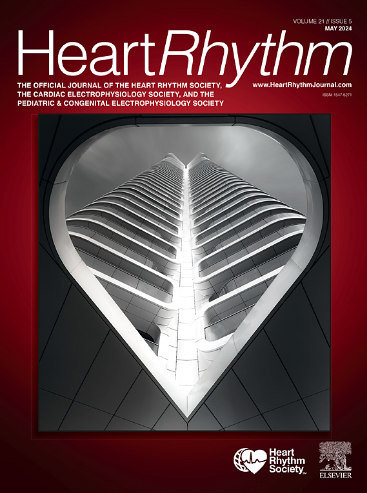房颤和心力衰竭的早期与延迟导管消融:系统回顾和荟萃分析。
IF 5.7
2区 医学
Q1 CARDIAC & CARDIOVASCULAR SYSTEMS
引用次数: 0
摘要
背景:心房颤动(AF)和心力衰竭(HF)经常共存,导致预后恶化。导管消融(CA)是一种成熟的治疗方法,但最佳时机尚不清楚。目的:评估早期与延迟CA对房颤和心衰患者临床结局的影响。方法:这项在prospero注册的系统评价(CRD42025643686)遵循PRISMA指南。纳入房颤和心衰成人的比较研究。早期CA被定义为在房颤诊断或心衰失代偿后不同时间范围内(通常≤12个月)进行消融,而延迟CA超过该时间。主要结局是房颤复发、全因死亡率和心衰住院。进行随机效应荟萃分析。结果:10项研究(n=15,822)对meta分析有贡献。早期CA与AF复发率显著降低相关(k=8;HR 0.63, 95% CI: 0.52-0.78, p2=0%),中度AF复发(I2=67.6%),高死亡率(I2=75.3%)。叙事综合包括另外两项比较治疗策略的随机对照试验。结论:来自综合观察性研究的证据表明,早期CA与房颤合并心衰患者房颤复发和房颤住院率降低有关;死亡率方面的益处并没有得到统计上的证实。由于依赖于观测数据和研究方法的异质性,解释需要谨慎。本文章由计算机程序翻译,如有差异,请以英文原文为准。

Early versus delayed catheter ablation in atrial fibrillation and heart failure: A systematic review and meta-analysis
Background
Atrial fibrillation (AF) and heart failure (HF) frequently coexist, worsening outcomes. Catheter ablation (CA) is an established therapy, but the optimal timing remains unclear.
Objective
This study aimed to evaluate the impact of early vs delayed CA on clinical outcomes in patients with AF and HF.
Methods
This International Prospective Register of Systematic Reviews–registered systematic review (CRD42025643686) adhered to the Preferred Reporting Items for Systematic Reviews and Meta-Analyses guidelines. Comparative studies enrolling adults with AF and HF were included. Early CA was defined as ablation performed within varying timeframes (often ≤12 months) after AF diagnosis or HF decompensation vs delayed CA beyond that period. Primary outcomes were AF recurrence, all-cause mortality, and HF hospitalizations. Random-effects meta-analyses were performed.
Results
Ten studies (n = 15,822) contributed to the meta-analyses. Early CA was associated with significantly reduced AF recurrence (k = 8, hazard ratio [HR] 0.63, 95% confidence interval [CI] 0.52–0.78, P < .0001) and HF hospitalization (k = 5, HR 0.63, 95% CI 0.51–0.77, P < .0001). A nonsignificant trend toward reduced all-cause mortality was observed (k = 4, HR 0.71, 95% CI 0.41–1.24, P = .23). Statistical heterogeneity was absent for HF hospitalization (I2 = 0%), moderate for AF recurrence (I2 = 67.6%), and high for mortality (I2 = 75.3%). Narrative synthesis included 2 additional randomized controlled trials comparing treatment strategies.
Conclusion
Evidence from pooled observational studies suggests early CA is associated with reduced AF recurrence and HF hospitalization in patients with AF and HF; a mortality benefit was not statistically confirmed. Interpretation warrants caution owing to reliance on observational data and methodological heterogeneity across studies.
求助全文
通过发布文献求助,成功后即可免费获取论文全文。
去求助
来源期刊

Heart rhythm
医学-心血管系统
CiteScore
10.50
自引率
5.50%
发文量
1465
审稿时长
24 days
期刊介绍:
HeartRhythm, the official Journal of the Heart Rhythm Society and the Cardiac Electrophysiology Society, is a unique journal for fundamental discovery and clinical applicability.
HeartRhythm integrates the entire cardiac electrophysiology (EP) community from basic and clinical academic researchers, private practitioners, engineers, allied professionals, industry, and trainees, all of whom are vital and interdependent members of our EP community.
The Heart Rhythm Society is the international leader in science, education, and advocacy for cardiac arrhythmia professionals and patients, and the primary information resource on heart rhythm disorders. Its mission is to improve the care of patients by promoting research, education, and optimal health care policies and standards.
 求助内容:
求助内容: 应助结果提醒方式:
应助结果提醒方式:


